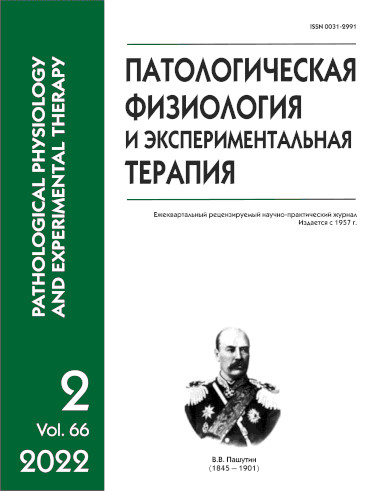Современные представления о роли митофагии в патогенезе острого ишемического инсульта
DOI:
https://doi.org/10.25557/0031-2991.2022.02.80-90Ключевые слова:
острый ишемический инсульт, аутофагия, аутофагосома, митофагия, рецепторы митофагии, митохондриальная динамика, митохондриальный потенциал, NLRP3-инфламмасома, постишемическое нейровоспалениеАннотация
Проблема ранней диагностики, профилактики и прогнозирования исхода острого ишемического инсульта (ИИ) по-прежнему актуальна. Особый интерес исследователей вызывает нейрональная гибель, осуществляемая по механизму аутофагии и митофагии (селективной аутофагии), активация которых отмечается после ишемической атаки. Результаты модельных экспериментов на животных показывают центральное вовлечение митохондриальной дисфункции в повреждение нейронов и клеток микроглии при остром ИИ. В то же время данные литературы, касающиеся роли митофагии в патогенезе острого ИИ, противоречивы и освещены недостаточно. Цель обзора – анализ современной литературы, посвященной экспериментальному изучению молекулярных механизмов митофагии и ее роли в патогенезе острого ИИ. При подготовке обзора использованы международные и отечественные базы данных: Scopus, Web of Science, Springer, РИНЦ. Анализ данных литературы позволил охарактеризовать ключевые митохондриальные белки, участвующие в сигнальных каскадах митофагии при остром ИИ, показал, что митофагия при остром ИИ играет двойственную роль, и ее участие в патогенезе данного заболевания неоднозначно. Обсуждаются результаты экспериментальных методов фармакологического модулирования защитной (базовой) митофагии в моделях острого ИИ.Загрузки
Опубликован
27-05-2022
Выпуск
Раздел
Обзоры
Как цитировать
[1]
2022. Современные представления о роли митофагии в патогенезе острого ишемического инсульта. Патологическая физиология и экспериментальная терапия. 66, 2 (May 2022), 80–90. DOI:https://doi.org/10.25557/0031-2991.2022.02.80-90.










